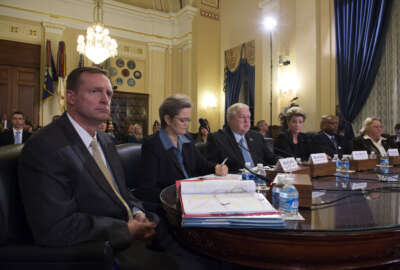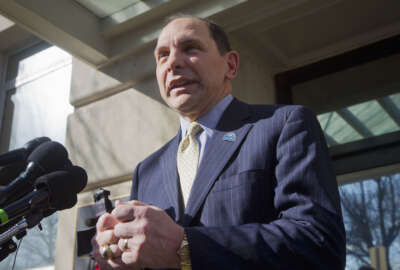
VA watchdog finds suicide hotline sent callers to voicemail
The Veterans Affairs Office of Inspector General says the VA's suicide hotline has been struggling to keep up with the growing volume of calls, and in some cases,...
The Veterans Affairs Office of Inspector General says the VA’s suicide hotline has been struggling to keep up with a growing volume of calls, and in some cases, veterans have been transferred to voicemail without getting through to a live operator.
The VA OIG’s report found that the Veterans Crisis Line received more than 450,000 calls in fiscal 2014, a nearly 40 percent increase from the previous year.
In order to accommodate the growing volume, more calls — about 77,000 calls in 2014 — have been transferred to backup call centers managed by contractors hired by VA.
During the course of its investigation, the OIG made 20 calls that were sent to voicemail by one backup call center, which never returned those calls. When VCL management investigated the backup center, it found that staff there were unaware that the voicemail system even existed.
“We substantiated the allegations that some calls routed to crisis backup centers went into a voicemail system and that the VCL and backup center staff did not always offer immediate assistance to callers,” the report said. “Routing to voicemail, instructing callers to call another party, or placing the caller on hold delays caller interaction with responders and could potentially affect caller access to needed crisis or emergency services.”
| Breakdown of calls answered by Veterans Crisis Line (Source: Veterans Affairs) | |||
| Fiscal year | Calls answered by VCL staff | Calls answered by backup center staff | |
| FY 2013 | 287,070 | 36,261 | |
| FY 2014 | 374,053 | 76,887 | |
| Percent growth | 30% | 112% | |
The watchdog study followed up on complaints filed by the Office of Special Counsel that backup training center staff did not receive adequate training to handle calls coming into the crisis hotline. The IG, however, said it could not verify the specifics of those allegations.
“The VCL program does not provide or monitor backup centers’ staff training; therefore, we could not substantiate that backup center staff, including volunteers, did not receive adequate training,” the report stated. “However, we found evidence that raised concerns regarding backup center training adequacy.”
The American Association of Suicidology, which accredits the VCL, doesn’t prohibit crisis hotlines from putting callers on hold or transferring them to voicemail, but it does require that calls received by commercially operated centers, like the VA’s backup centers, “reach a trained crisis worker (VCL responder) within 1 minute of placing a call.”
In a call with reporters Feb. 25, VA Deputy Secretary Sloan Gibson said the report was misleading because it was based on outdated information.
House Veterans Affairs Committee Chairman Jeff Miller (R-Fla.), meanwhile, cited the report as a sign that the Veterans Health Administration, which oversee the hotline, is in need of urgent attention.
“While the report documents widespread failures in training among those tasked with responding to veterans, the larger issue is that this situation shows that the VA employees in charge of running the crisis line were asleep at the switch — utterly unfamiliar with the day-to-day operations of the program,” Miller said in a statement. “In order to prevent problems like this from occurring in the future, those responsible must be held accountable and VA should be completely transparent with the public regarding the status of the veterans whose calls went unanswered as well as the steps the department took to get them the help they needed.”
Senate Armed Services Committee Chairman John McCain (R-Ariz.) also found the report troubling.
“I am deeply saddened and disappointed by the VA IG’s findings confirming that veterans’ calls to a VA-run suicide hotline have gone unanswered in recent years,” he said in a statement. “The VA’s failure to help our most vulnerable veterans is not only unacceptable, but it is shameful.”
Copyright © 2025 Federal News Network. All rights reserved. This website is not intended for users located within the European Economic Area.
Jory Heckman is a reporter at Federal News Network covering U.S. Postal Service, IRS, big data and technology issues.
Follow @jheckmanWFED
Related Stories





